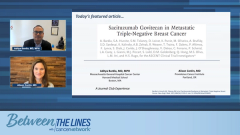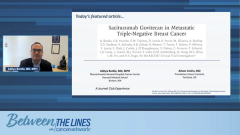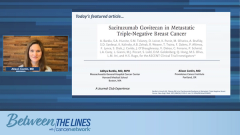
Metastatic Triple-Negative Breast Cancer: An Evolving Treatment Landscape
Key opinion leaders Aditya Bardia, MD, MPH, and Alison Conlin, MD, provide a broad view of the current metastatic triple-negative breast cancer treatment landscape.
Episodes in this series

Transcript:
Aditya Bardia, MD, MPH: Hello, and welcome to the CancerNetwork® Between the Lines program. Today’s featured article is “Sacituzumab Govitecan in Metastatic Triple-Negative Breast Cancer, the ASCENT Clinical Trial.” I’m Aditya Bardia, a breast medical oncologist at Massachusetts General Hospital and Harvard Medical School in Boston [Massachusetts]. Joining me is Dr Alison Conlin.
Alison Conlin, MD: Hi, everybody.
Aditya Bardia, MD, MPH: Dr Conlin is at Providence Cancer Institute in Portland, Oregon. We’re fortunate to have her today. We’ll review a couple of things. Let’s start with management of TNBC [triple-negative breast cancer] and the current landscape; then talk about TROP2 in metastatic TNBC; and finally about sacituzumab govitecan, the rationale, the clinical trial, and future directions. Dr Conlin, in terms of management of TNBC, what types of patients do you typically see in practice with TNBC?
Alison Conlin, MD: These are our most challenging patients at times, when they have metastatic disease. Everyone would agree. We worry when these patients recur, especially if they’ve had prior therapy; they can be chemotherapy-refractory. Their disease can progress extremely quickly, and we feel like we need to get treatment going and try to control their disease. They can be younger patients, and they can present sicker if they have more visceral disease. Overall, we probably feel the most challenge with these patients in our practice.
Aditya Bardia, MD, MPH: Absolutely. Of all the three breast cancer subtypes, this is the most aggressive. In your experience, what’s the general prognosis of a patient with metastatic TNBC?
Alison Conlin, MD: Sadly, these patients often don’t make it to 1 or 2 years. We see them have short disease progressive intervals. They’re often refractory to many lines of chemotherapy. Generally, it’s a poor prognosis, and that’s why we’re always looking for new therapies that may help extend their lives.
Aditya Bardia, MD, MPH: That’s a good point. That’s why it’s a major unmet need in the field of breast oncology. Before we talk about antibody-drug conjugates [ADCs], could you provide an overview in terms of the typical treatments besides ADCs for management of a patient with metastatic TNBC?
Alison Conlin, MD: Our backbones have been the taxanes and anthracyclines. Going back to our most effective chemotherapy, typically we’re starting with a taxane if there’s enough of a disease-free. If not, gemcitabine-carboplatin is been a typical combination chemotherapy we’ve used. Additionally, with the advent of immunotherapy, we’re looking for immunotherapy-sensitive patients. That’s not in the majority of patients, so we’re hoping we find some sort of home run with that. What do you find you’re seeing in your practice? Are you also looking to use those agents?
Aditya Bardia, MD, MPH: Absolutely. It’s usually a platinum or a taxane as first-line therapy. If a patient has PD-L1–positive metastatic TNBC, then we add immunotherapy. The problem is that these drugs work for 4 to 6 months on an average, and then patients have disease progression.
Alison Conlin, MD: The challenge is that even if you have something that works, it’s not for long, so we’re trying to find an agent that might be more matched. Can you talk about the targeting of trophoblast cell-surface antigen TROP2 in breast cancer?
Aditya Bardia, MD, MPH: Absolutely. For years, chemotherapy has been the mainstay of management of TNBC, but the response to chemotherapy isn’t high, and it’s associated with significant toxicity. Taxol can cause neuropathy, and platinums can cause neuropathy myelosuppression as well. There’s been a need for better therapies. Over the past few years, we’ve seen an explosion in antibody-drug conjugates. The idea is that you have an antibody that targets something that’s overexpressed in cancer cells, not so much in normal cells, and then can deliver a payload more targeted toward the cancer cells. It’s more specific for cancer cells compared with normal cells, so you have a better therapeutic index. An example of this is TROP2, which is an epithelial antigen that’s overexpressed in more than 90% of triple-negative breast cancers. It’s also seen in hormone receptor–positive breast cancers and other epithelial tumors as well. Because it’s overexpressed in TNBC and that has been an unmet need in the field of breast oncology, there’s been a lot of interest in targeting this antigen with antibody-drug conjugates.
Alison Conlin, MD: What’s the impact of this agent, this ADC to TROP2 sacituzumab govitecan? How has that impacted our field, especially in triple-negative [breast cancer]?
Aditya Bardia, MD, MPH: Sacituzumab govitecan is the first-in-class antibody-drug conjugate against TROP2, and IT has been a game changer in the field of triple-negative breast cancer and maybe breast oncology in general. In the ASCENT trial, which we’ll review soon, it showed a significant improvement in outcomes in patients who received sacituzumab govitecan compared with standard of care. This was the first agent, and there are other TROP2-directed antibody-drug conjugates. For example, datopotamab deruxtecan is being investigated for patients with metastatic TNBC and other cancers. Sacituzumab govitecan was the first agent that provided proof of principle, and that’s led to interest in other ADCs.
Alison Conlin, MD: Increasing survival in these patients with metastatic TNBC is the gold standard. Being able to achieve that changes things for our patients.
Transcript edited for clarity.
Newsletter
Stay up to date on recent advances in the multidisciplinary approach to cancer.







































